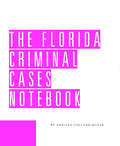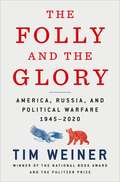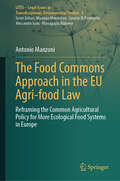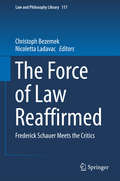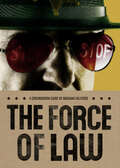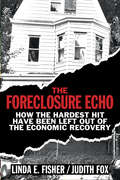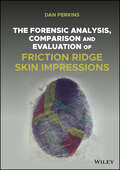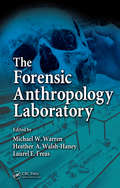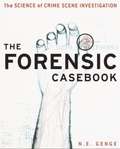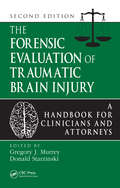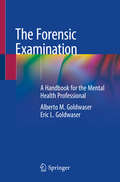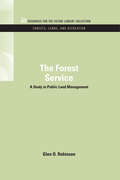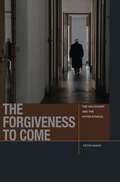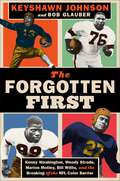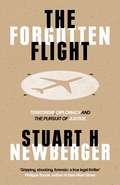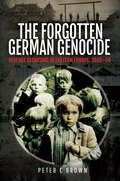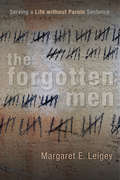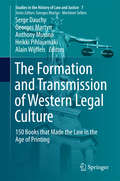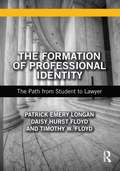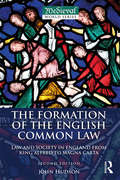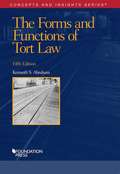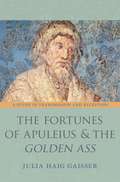- Table View
- List View
The Florida Criminal Cases Notebook
by Kurt Erlenback Adriana Collado-HudakYour First and Last Stop for Florida Criminal Citations With respected Florida criminal attorney Adriana Collado-Hudak on board as the new author, this year's edition of Florida Criminal Cases Notebook continues the guide's tradition of boiling key Florida criminal cases down to succinct summaries of their facts and holdings. The new edition of Florida Criminal Cases Notebook includes over 125 new case summaries, organized by topic and court circuit, so you can keep you up-to-date with the latest case law. Author Kurt Erlenbach, one of the most respected Florida criminal attorneys, has boiled the key criminal cases since 1987 down to succinct summaries of their facts and holdings. One to three sentences cover most cases. All case summaries are first organized by one of 150 topics, and then second by circuit. The most recent cases are positioned first. The end result is a quick-reading, easy-access summary of virtually the entire body of Florida criminal case law. Florida Criminal Cases Notebook amasses more than 8,000 case summaries, including every key criminal case since 1987. Written by one of the leading criminal specialists in Florida, it offers quick access to the most important cases with a comprehensive topical index. It's updated twice annually to keep you up-to-date with the latest case law. The Notebook includes the following: Special emphasis on sentencing, evidence and search & seizure Broad coverage of frequently arising trial topics Detailed notes with expanded factual background Useful index and table of contents Ask most Florida judges, public defenders and state prosecutors where they look for fast criminal citations and you'll likely get the same answer: Florida Criminal Cases Notebook. Written with a busy criminal attorney in mind, the Notebook gives you instant access key cases and information. If there's a point to be made, you'll find it here.
The Folly and the Glory: America, Russia, and Political Warfare 1945-2020
by Tim WeinerFrom Tim Weiner, winner of the Pulitzer Prize and the National Book Award, an urgent and gripping account of the seventy-five-year battle between the United States and Russia that led to the election and impeachment of an American president. With vivid storytelling and riveting insider accounts, Tim Weiner traces the roots of political warfare--the conflict America and Russia have waged with espionage, sabotage, diplomacy, and disinformation--from 1945 until 2020. America won the cold war, but Russia is winning today. Vladimir Putin helped to put his chosen candidate in the White House with a covert campaign that continues to this moment. Putin's Russia has revived Soviet-era intelligence operations, gaining ever more potent information from--and influence over--the American people and government. Yet the United States has put little power into its defense. This has put American democracy in peril. Weiner takes us behind closed doors, illuminating Russian and American intelligence operations and their consequences. To get to the heart of what is at stake and find potential solutions, he examines long-running twentieth-century CIA operations, the global political machinations of the Soviet KGB, the erosion of American political warfare after the cold war, and how twenty-first-century Russia has kept the cold war alive. He provides details of US duplicity with Russia which caused resentment and anger and US involvement in the murder of Congo's Patrice Lumumba and our wrongful support of Mobutu. The Folly and the Glory is an urgent call to our leaders and citizens to understand the nature of political warfare--and to change course before it's too late. TIM WEINER has won the Pulitzer Prize and the National Book Award for his reporting and writing on national security and intelligence. He covered the CIA, the war in Afghanistan, and crises and conflicts in fourteen nations for the New York Times. Weiner has taught history and writing at Princeton and Columbia. The Folly and the Glory is his sixth book.
The Food Commons Approach in the EU Agri-food Law: Reframing the Common Agricultural Policy for More Ecological Food Systems in Europe (LITES - Legal Issues in Transdisciplinary Environmental Studies #3)
by Antonio ManzoniThis book presents a thorough analysis of the innovative food commons approach in relation to the EU Common Agricultural Policy (CAP). The debates surrounding this pivotal European policy have always been robust, and with the ambitious targets outlined by the UN Sustainable Development Goals and the European Green Deal, they are poised to become even more prominent. To effectively realize these objectives, it is imperative to systematically reassess the fundamental structures of our food systems and enact substantive reforms within EU agri-food law and policymaking. The food commons approach represents not only a novel theoretical framework, but also, and foremost, a dynamic socio-political movement that has garnered attention from both researchers and policymakers due to its pioneering nature. Rejecting the prevailing paradigm of absolute commodification of food, this approach endeavours to reconceptualize our food systems through the prisms of ecology, social inclusion, collective governance, and resilience. The overarching objective of this book is to scrutinize the potential of this novel approach to fundamentally reshape the theoretical underpinnings of EU agri-food law, ultimately facilitating the realization of more sustainable and just food systems. The target audience of this book mainly consists of academic researchers, but also practitioners and policymakers working on agricultural and environmental studies, due to its interdisciplinary approach and the originality of its content. Along the same lines, the book will appeal to NGOs, indigenous peoples, and food sovereignty movements around the world.
The Force of Law
by Frederick SchauerMany legal theorists maintain that laws are effective because we internalize them, obeying even when not compelled to do so. In a comprehensive reassessment of the role of force in law, Frederick Schauer disagrees, demonstrating that coercion, more than internalized thinking and behaving, distinguishes law from society's other rules.
The Force of Law Reaffirmed
by Christoph Bezemek Nicoletta LadavacThis book examines the success of Frederick Schauer's efforts to reclaim force as a core element of a general concept of law by approaching the issue from different legal traditions and distinct perspectives. In discussing Schauer's main arguments, it contributes to answering the question whether force, sanctions and coercion should (or should not) be regarded as necessary elements of the concept of law, and whether legal philosophy should be concerned at all (or exclusively) with necessary or essential properties. While it was long assumed that legal norms are essentially defined by their force, it was H. L. A. Hart who raised doubts about whether law and coercion are necessarily connected, referring to the empowering, or more generally enabling, character exhibited by some legal norms. Prominent scholars following and refining Hart's argument built an influential case for excluding force as a necessary element of the concept of law. Most recently, however, Frederick Schauer has made a strong case to reaffirm the force of law, shedding new light on this essential question. This book collects important commentaries, never before published, by prominent legal philosophers evaluating Schauer's substantive arguments and his claims about jurisprudential methodology.
The Force of Law: A Groundwork Guide (Groundwork Guides)
by Mariana ValverdeThis book examines the meaning of law from a global perspective and the many connections between law and law enforcement. An excellent introduction to the subject for young adults. Most of us in liberal democratic countries think that we live under the rule of law. Governments make the rules, we live by them and the police enforce them if we try to break them. The Force of Law critically examines these assumptions. Award-winning criminologist Mariana Valverde makes clear that while the law is usually regarded as the civilized, non-violent way to deal with harms and conflicts, violence is integral to law. After all, police are authorized to handcuff, manhandle, taser, and even kill people, and courts of law confine people to prison and, in some countries, order that they be put to death. Valverde shows that "proper" law is not always distinguishable from the rules imposed by various bodies of armed men. Worldwide, private security guards often act like police, but they serve their private clients, not the public at large. And publicly paid police officers spend much of their time managing information for other bureaucracies, instead of actually fighting crime or arresting criminals. "[The Groundwork Guides] are excellent books, mandatory for school libraries and the increasing body of young people prepared to take ownership of the situations and problems previous generations have left them." — Globe and Mail Correlates to the Common Core State Standards in English Language Arts: CCSS.ELA-LITERACY.RI.6.1 Cite textual evidence to support analysis of what the text says explicitly as well as inferences drawn from the text. CCSS.ELA-LITERACY.RI.6.2 Determine a central idea of a text and how it is conveyed through particular details; provide a summary of the text distinct from personal opinions or judgments. CCSS.ELA-LITERACY.RI.6.3 Analyze in detail how a key individual, event, or idea is introduced, illustrated, and elaborated in a text (e.g., through examples or anecdotes). CCSS.ELA-LITERACY.RI.6.6 Determine an author's point of view or purpose in a text and explain how it is conveyed in the text.
The Foreclosure Echo: How the Hardest Hit Have Been Left Out of the Economic Recovery
by Judith Fox Linda E. FisherThe Foreclosure Echo tells the story of the ordinary people whose quest for the American dream was crushed in the foreclosure crisis when they were threatened with losing their homes. The authors, Linda E. Fisher and Judith Fox - each with decades of experience defending low-to-moderate-income people from foreclosure and predatory lending practices - have employed a range of legal, economic, and social-science research to document these stories, showing not only how people experienced the crisis, but also how lenders and public institutions failed to protect them. The book also describes the ongoing effects of the crisis - including vacant land and abandoned buildings - and how these conditions have exacerbated the economic plight of millions of people who lost their homes and have increased inequality across the country. This book should be read by anyone who wants to understand the fallout of the last financial crisis and learn what we can do now to avoid another one.
The Forensic Analysis, Comparison and Evaluation of Friction Ridge Skin Impressions
by Dan G. PerkinsTHE FORENSIC ANALYSIS, COMPARISON AND EVALUATION OF FRICTION RIDGE SKIN IMPRESSIONS An accessible, highly practical introduction to the ACE framework fingerprint examiners use to analyse, compare and evaluate friction ridge skin impressions. When friction ridge skin (the skin on the undersides of the hands and feet) contacts a surface an impression of it may be left behind. Impressions that are left inadvertently, for example at a scene where a crime is alleged to have been committed are known as ‘marks’. Impressions taken intentionally from a person, for example as a result of their arrest are known as ‘prints’. The Forensic Analysis, Comparison and Evaluation of Friction Ridge Skin Impressions offers step-by-step instruction to examiners tasked with identifying people by the marks they leave behind. Assuming no previous knowledge of the subject, this easy-to-use guide breaks down the ACE (Analysis, Comparison and Evaluation) framework into 10 key questions that provide clear guidance on: establishing the most evidentially valuable mark; the type of details the mark may reveal; the effects of distortion; how to determine which area of skin is most likely to have made the mark, and more. Author Dan Perkins draws upon his years of experience to equip fingerprint examiners with the key skills needed to carry out the appropriate analysis, comparison and evaluation of friction ridge skin impressions. Presents a stepwise approach designed for both novice and more experienced fingerprint examiners Discusses all aspects of ACE, including the formation of fingerprints, documentation, suitability, and orientation Contains references to relevant research, real-world case studies, and hundreds of impressions the reader can analyse and compare Includes five detailed appendices covering fabrication, transplantation and forgery, verification, bias, activity level propositions, and errors The Forensic Analysis, Comparison and Evaluation of Friction Ridge Skin Impressions is an indispensable ACE ‘checklist’ for trainees in the field of fingerprint comparison and identification, qualified fingerprint examiners and forensic science students.
The Forensic Anthropology Laboratory
by Michael W. Warren Heather A. Walsh-Haney Laurel E. FreasWhile other books cover general topics and various subsets of forensic anthropology, this one-of-a-kind reference compiles the best practices of policies, procedures, and protocols of different laboratories across the world. This book brings together experts in every aspect of forensic anthropology to consider physical plant demands, equipment needs, staffing, ethical issues, and the process of certification with the American Society of Crime Laboratory Directors. With examples of implementation, The Forensic Anthropology Laboratory also provides discussion of proven methods in skeletal preparation, laboratory flow, and specimen curation including processing logs and sample forms.
The Forensic Casebook: The Science of Crime Scene Investigation
by N. E. GengeTHE ULTIMATE READERS' GUIDE TO THE ART OF FORENSICS! An intrepid investigator crawls through miles of air conditioning ducts to capture the implicating fibers of a suspect's wool jacket . . . A forensic entomologist discovers insects in the grill of a car and nails down a drug dealer's precise geographical path . . . A gluttonous criminal's fingerprints are lifted from a chocolate truffle. . . . Filled with these and many other intriguing true stories, and packed with black and white illustrations and photographs, The Forensic Casebook draws on interviews with police personnel and forensic scientists--including animal examiners, botanists, zoologists, firearms specialists, and autoposists--to uncover the vast and detailed underworkings of criminal investigation. Encyclopedic in scope, this riveting, authoritative book leaves no aspect of forensic science untouched, covering such fascinating topics as:* Securing a crime scene* Identifying blood splatter patterns* Collecting fingerprints--and feet, lip, and ear prints* Interpreting the stages of a body's decay* Examining hair and fiber evidence* Trace evidence from firearms and explosives* "Lifting" DNA prints* Computer crime and forensic photography* Career paths in criminal scienceLucidly written and spiked with real crime stories, The Forensic Casebook exposes the nitty gritty that other books only touch upon. Here is a reference book as addictive as a page-turning novel of suspense.From the Trade Paperback edition.
The Forensic Evaluation of Traumatic Brain Injury: A Handbook for Clinicians and Attorneys, Second Edition
by Donald Starzinski Gregory J. MurreyDrawing on the expertise of several well-known figures in the medical, neuropsychological, and legal professions, Forensic Evaluation of Traumatic Brain Injury: A Handbook for Clinicians and Attorneys, Second Edition provides a concise, general overview of the forensic assessment process and the issues surrounding Traumatic Brain Injury (TBI). The
The Forensic Examination: A Handbook for the Mental Health Professional
by Alberto M. Goldwaser Eric L. GoldwaserThis book prepares the mental health professional to use scientific skills when working within a legal framework. Written by a seasoned forensic psychiatrist with decades of experience and professional honors, this text answers some of the most challenging questions psychiatrists face when mental health intersects with the courtroom. The text is supported with 34 case vignettes that demonstrate ways in which seemingly simple diagnoses have unique layers of complexities that are vital within the legal system. The resource covers topics that may not be elucidated in medical schools, including what to expect from an expert witness, how to communicate with attorneys who lack a medical background, managing opposing viewpoints, psychiatric and medical malpractice, harassment, employment status, and other difficult topics as it pertains to the law. The text also knits this understanding of forensic psychiatry with clinical knowledge, addressing violence and risk assessment, discrimination, disability evaluation, psychiatric disorders, criminal and civil competence, end-of-life care and decisions, and a wide array of medical topics that have unique concerns when placed in the context of the legal system.The Forensic Examination is a vital resource for psychiatrists, psychologists, criminal and civil defenders, and all professionals working with persons in the medicolegal system.
The Forest Service: A Study in Public Land Management (RFF Forests, Lands, and Recreation Set)
by Glen O. RobinsonFirst Published in 2011. Routledge is an imprint of Taylor & Francis, an informa company.
The Forgiveness to Come: The Holocaust and the Hyper-Ethical (Just Ideas)
by Peter Jason BankiThis book is concerned with the aporias, or impasses, of forgiveness, especially in relation to the legacy of the crimes against humanity perpetrated by the Nazis and their collaborators during World War II. Banki argues that, while forgiveness of the Holocaust is and will remain impossible, we cannot rest upon that impossibility. Rather, the impossibility of forgiveness must be thought in another way. In an epoch of “worldwidization,” we may not be able simply to escape the violence of scenes and rhetoric that repeatedly portray apology, reconciliation, and forgiveness as accomplishable acts. Accompanied by Jacques Derrida’s thought of forgiveness of the unforgivable, and its elaboration in relation to crimes against humanity, the book undertakes close readings of literary, philosophical, and cinematic texts by Simon Wiesenthal, Jean Améry, Vladimir Jankélévitch, Robert Antelme and Eva Mozes Kor. These texts contend with the idea that the crimes of the Nazis are inexpiable, that they lie beyond any possible atonement or repair. Banki argues that the juridical concept of crimes against humanity calls for a thought of forgiveness—one that would not imply closure of the infinite wounds of the past. How could such a forgiveness be thought or dreamed? Banki shows that if today we cannot simply escape the “worldwidization” of forgiveness, then it is necessary to rethink what forgiveness is, the conditions under which it supposedly takes place, and especially its relation to justice.
The Forgotten First: Kenny Washington, Woody Strode, Marion Motley, Bill Willis, and the Breaking of the NFL Color Barrier
by Keyshawn Johnson Bob GlauberThe unknown story of the Black pioneers who collectively changed the face of the NFL in 1946.THE FORGOTTEN FIRST chronicles the lives of four incredible men, the racism they experienced as Black players entering a segregated sport, the burden of expectation they carried, and their many achievements, which would go on to affect football for generations to come.More than a year before Jackie Robinson broke the color barrier in Major League Baseball, there was another seismic moment in pro sports history. On March 21,1946, former UCLA star running back Kenny Washington—a teammate of Robinson's in college—signed a contract with the Los Angeles Rams. This ended one of the most shameful periods in NFL history, when African-American players were banned from league play.Washington would not be alone in serving as a pioneer for NFL integration. Just months after he joined the Rams, thanks to a concerted effort by influential Los Angeles political and civic leaders, the team signed Woody Strode, who played with both Washington and Robinson at UCLA in one of the most celebrated backfields in college sports history. And that same year, a little-known coach named Paul Brown of the fledgling Cleveland Browns signed running back Marion Motley and defensive lineman Bill Willis, thereby integrating a startup league that would eventually merge with the NFL.THE FORGOTTEN FIRST tells the story of one of the most significant cultural shifts in pro football history, as four men opened the door to opportunity and changed the sport forever.
The Forgotten Flight: Terrorism, Diplomacy and the Pursuit of Justice
by Stuart H. NewbergerOn 19 September 1989, 170 people were killed when French Airlines UTA Flight 772 was destroyed by a suitcase bomb while en route from Chad to Paris. Despite being one of the deadliest acts of terrorism in history, it remained overshadowed by the Lockerbie tragedy that had taken place ten months earlier. Both attacks were carried out at the instruction of Libyan dictator Qaddafi, but while &“Lockerbie&” became synonymous with international terrorism, UTA 772 became the &“forgotten flight&”. As a lawyer, Stuart H. Newberger represented the families of the seven Americans killed in the UTA 772 attack. Now he brings all the pieces together to tell its story for the first time, revealing in riveting prose how French investigators cracked the case and taking us inside the courtroom to witness the litigation against the Libyan state that followed. In the age of globalization, The Forgotten Flight provides a fascinating insight into the pursuit of justice across international borders.
The Forgotten German Genocide: Revenge Cleansing in Eastern Europe, 1945–50
by Peter C. BrownThe Potsdam Conference (officially known as the "Berlin Conference"), was held from 17 July to 2 August 1945 at Cecilienhof Palace, the home of Crown Prince Wilhelm, in Brandenburg, and saw the leaders of the United Kingdom, the Soviet Union and the United States, gathered together to decide how to demilitarize, denazify, decentralize, and administer Germany, which had agreed to unconditional surrender on 8 May (VE Day). They determined that the remaining German populations in Poland, Czechoslovakia and Hungary - both the ethnic (Sudeten) and the more recent arrivals (as part of the long-term plan for the domination of Eastern Europe) - should to be transferred to Germany, but despite an undertaking that these would be effected in an orderly and humane manner, the expulsions were carried out in a ruthless and often brutal manner. Land was seized with farms and houses expropriated; the occupants placed into camps prior to mass expulsion from the country. Many of these were labor camps already occupied by Jews who had survived the concentration camps, where they were equally unwelcome. Further cleansing was carried out in Romania and Yugoslavia, and by 1950, an estimated 11.5 million German people had been removed from Eastern Europe with up to three million dead. The number of ethnic Germans killed during the ‘cleansing’ period is suggested at 500,000, but in 1958, Statistisches Bundesamt (the Federal Statistical Office of Germany) published a report which gave the figure of 1.6 million relating to expulsion-related population losses in Poland alone. Further investigation may in due course provide a more accurate figure to avoid the accusation of sensationalism.
The Forgotten Men
by Margaret E. LeigeyToday there are approximately fifty thousand prisoners in American prisons serving life without parole, having been found guilty of crimes ranging from murder and rape to burglary, carjacking, and drug offences. In The Forgotten Men, criminologist Margaret E. Leigey provides an insightful account of a group of aging inmates imprisoned for at least twenty years, with virtually no chance of release. These men make up one of the most marginalized segments of the contemporary U.S. prison population. Considered too dangerous for rehabilitation, ignored by prison administrators, and overlooked by courts disinclined to review such sentences, these prisoners grow increasingly cut off from family and the outside world. Drawing on in-depth interviews with twenty-five such prisoners, Leigey gives voice to these extremely marginalized inmates and offers a look at how they struggle to cope. She reveals, for instance, that the men believe that permanent incarceration is as inhumane as capital punishment, calling life without parole "the hard death penalty." Indeed, after serving two decades in prison, some wished that they had received the death penalty instead. Leigey also recounts the ways in which the prisoners attempt to construct meaningful lives inside the bleak environment where they will almost certainly live out their lives. Every state in the union (except Alaska) has the life-without-parole sentencing option, despite its controversial nature and its staggering cost to the taxpayer. The Forgotten Men provides a much-needed analysis of the policies behind life-without-parole sentencing, arguing that such sentences are overused and lead to serious financial and ethical dilemmas.
The Formation and Transmission of Western Legal Culture
by Anthony Musson Serge Dauchy Georges Martyn Heikki Pihlajamäki Alain WijffelsThis volume surveys 150 law books of fundamental importance in the history of Western legal literature and culture. The entries are organized in three sections: the first dealing with the transitional period of fifteenth-century editions of medieval authorities, the second spanning the early modern period from the sixteenth to the eighteenth century, and the third focusing on the nineteenth and twentieth centuries. The contributors are scholars from all over the world. Each 'old book' is analyzed by a recognized specialist in the specific field of interest. Individual entries give a short biography of the author and discuss the significance of the works in the time and setting of their publication, and in their broader influence on the development of law worldwide. Introductory essays explore the development of Western legal traditions, especially the influence of the English common law, and of Roman and canon law on legal writers, and the borrowings and interaction between them. The book goes beyond the study of institutions and traditions of individual countries to chart a broader perspective on the transmission of legal concepts across legal, political, and geographical boundaries. Examining the branches of this genealogical tree of books makes clear their pervasive influence on modern legal systems, including attempts at rationalizing custom or creating new hybrid systems by transplanting Western legal concepts into other jurisdictions.
The Formation of Professional Identity: The Path from Student to Lawyer
by Patrick Emery Longan Daisy Hurst Floyd Timothy W. FloydBecoming a lawyer is about much more than acquiring knowledge and technique. As law students learn the law and acquire some basic skills, they are also inevitably forming a deep sense of themselves in their new roles as lawyers. That sense of self – the student’s nascent professional identity – needs to take a particular form if the students are to fulfil the public purposes of lawyers and find deep meaning and satisfaction in their work. In this book, Professors Patrick Longan, Daisy Floyd, and Timothy Floyd combine what they have learned in many years of teaching and research concerning the lawyer’s professional identity with lessons derived from legal ethics, moral psychology, and moral philosophy. They describe in depth the six virtues that every lawyer needs as part of his or her professional identity, and they explore both the obstacles to acquiring and deploying those virtues and strategies for overcoming those impediments. The result is a straightforward guide for law students on how to cultivate a professional identity that will allow them to make a meaningful difference in the lives of others and to flourish as individuals.
The Formation of the English Common Law: Law and Society in England from King Alfred to Magna Carta (The Medieval World)
by John HudsonThe Formation of English Common Law provides a comprehensive overview of the development of early English law, one of the classic subjects of medieval history. This much expanded second edition spans the centuries from King Alfred to Magna Carta, abandoning the traditional but restrictive break at the Norman Conquest. Within a strong interpretative framework, it also integrates legal developments with wider changes in the thought, society, and politics of the time. Rather than simply tracing elements of the common law back to their Anglo-Saxon, Norman or other origins, John Hudson examines and analyses the emergence of the common law from the interaction of various elements that developed over time, such as the powerful royal government inherited from Anglo-Saxon England and land holding customs arising from the Norman Conquest. Containing a new chapter charting the Anglo-Saxon period, as well as a fully revised Further Reading section, this new edition is an authoritative yet highly accessible introduction to the formation of the English common law and is ideal for students of history and law.
The Forms and Functions of Tort Law (Concepts and Insights Series)
by Kenneth AbrahamThe perfect accompaniment to any torts casebook, this text covers all the major cases and issues in a standard torts course. The text addresses cases and analyzes their implications, presenting the law of torts within a curricular context and covering the materials that law students are likely to encounter in a variety of courses. This straightforward, readable text addresses both rules and policy, and presents topics in a way that helps students effectively grapple with issues. Since each chapter stands on its own, the book is ideal as a classroom text, as well as for self-directed reading by students.
The Forms and Functions of Tort Law (second edition)
by Kenneth S. AbrahamThis book is designed to provide a concise analysis of the conceptual foundations of tort liability.
The Fortunes of Apuleius and the Golden Ass: A Study in Transmission and Reception (Martin Classical Lectures #32)
by Julia Haig GaisserThis book traces the transmission and reception of one of the most influential novels in Western literature. The Golden Ass, the only ancient Roman novel to survive in its entirety, tells of a young man changed into an ass by magic and his bawdy adventures and narrow escapes before the goddess Isis changes him back again. Its centerpiece is the famous story of Cupid and Psyche. Julia Gaisser follows Apuleius' racy tale from antiquity through the sixteenth century, tracing its journey from roll to codex in fourth-century Rome, into the medieval library of Monte Cassino, into the hands of Italian humanists, into print, and, finally, over the Alps and into translation in Spanish, French, German, and English. She demonstrates that the novel's reception was linked with Apuleius' reputation as a philosopher and the persona he projected in his works. She relates Apuleius and the Golden Ass to a diverse cast of important literary and historical figures--including Augustine, Fulgentius, Petrarch, Boccaccio, Bessarion, Boiardo, and Beroaldo. Paying equal attention to the novel's transmission (how it survived) and its reception (how it was interpreted), she places the work in its many different historical contexts, examining its representation in art, literary imitation, allegory, scholarly commentary, and translation. The volume contains several appendixes, including an annotated list of the manuscripts of the Golden Ass. This book is based on the author's Martin Classical Lectures at Oberlin College in 2000.
The Foundation and Construction of Ethics
by Franz BrentanoChosen and edited by Franziska Mayer-Hillebrand, translated by Elizabeth Hughes Schneewind, this collection of essays reflects Brentano's lectures at the University of Vienna from 1876 to 1894.
